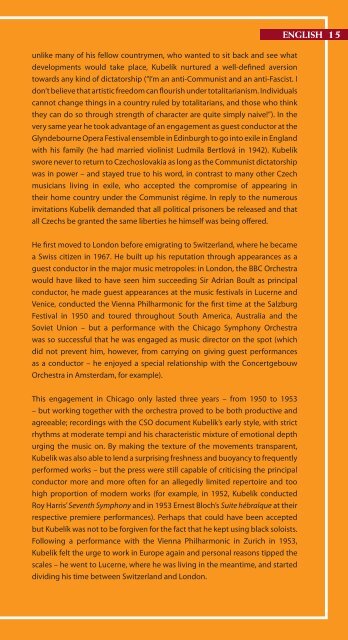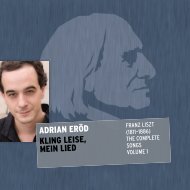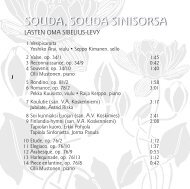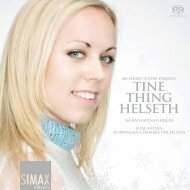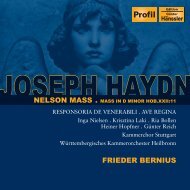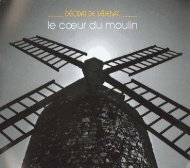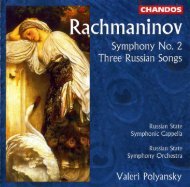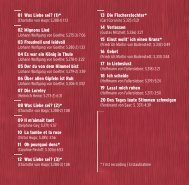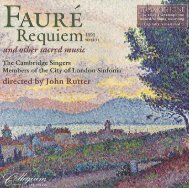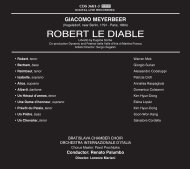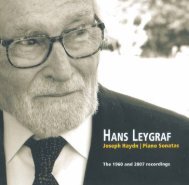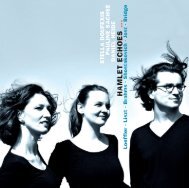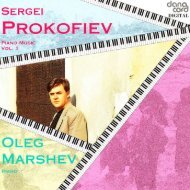RAFAEL KUBELÍK
RAFAEL KUBELÍK
RAFAEL KUBELÍK
Sie wollen auch ein ePaper? Erhöhen Sie die Reichweite Ihrer Titel.
YUMPU macht aus Druck-PDFs automatisch weboptimierte ePaper, die Google liebt.
unlike many of his fellow countrymen, who wanted to sit back and see what<br />
developments would take place, Kubelík nurtured a well-defined aversion<br />
towards any kind of dictatorship (“I’m an anti-Communist and an anti-Fascist. I<br />
don’t believe that artistic freedom can flourish under totalitarianism. Individuals<br />
cannot change things in a country ruled by totalitarians, and those who think<br />
they can do so through strength of character are quite simply naive!”). In the<br />
very same year he took advantage of an engagement as guest conductor at the<br />
Glyndebourne Opera Festival ensemble in Edinburgh to go into exile in England<br />
with his family (he had married violinist Ludmila Bertlová in 1942). Kubelík<br />
swore never to return to Czechoslovakia as long as the Communist dictatorship<br />
was in power – and stayed true to his word, in contrast to many other Czech<br />
musicians living in exile, who accepted the compromise of appearing in<br />
their home country under the Communist régime. In reply to the numerous<br />
invitations Kubelík demanded that all political prisoners be released and that<br />
all Czechs be granted the same liberties he himself was being offered.<br />
ENGLISH 15<br />
He first moved to London before emigrating to Switzerland, where he became<br />
a Swiss citizen in 1967. He built up his reputation through appearances as a<br />
guest conductor in the major music metropoles: in London, the BBC Orchestra<br />
would have liked to have seen him succeeding Sir Adrian Boult as principal<br />
conductor, he made guest appearances at the music festivals in Lucerne and<br />
Venice, conducted the Vienna Philharmonic for the first time at the Salzburg<br />
Festival in 1950 and toured throughout South America, Australia and the<br />
Soviet Union – but a performance with the Chicago Symphony Orchestra<br />
was so successful that he was engaged as music director on the spot (which<br />
did not prevent him, however, from carrying on giving guest performances<br />
as a conductor – he enjoyed a special relationship with the Concertgebouw<br />
Orchestra in Amsterdam, for example).<br />
This engagement in Chicago only lasted three years – from 1950 to 1953<br />
– but working together with the orchestra proved to be both productive and<br />
agreeable; recordings with the CSO document Kubelík’s early style, with strict<br />
rhythms at moderate tempi and his characteristic mixture of emotional depth<br />
urging the music on. By making the texture of the movements transparent,<br />
Kubelík was also able to lend a surprising freshness and buoyancy to frequently<br />
performed works – but the press were still capable of criticising the principal<br />
conductor more and more often for an allegedly limited repertoire and too<br />
high proportion of modern works (for example, in 1952, Kubelík conducted<br />
Roy Harris’ Seventh Symphony and in 1953 Ernest Bloch’s Suite hébraïque at their<br />
respective premiere performances). Perhaps that could have been accepted<br />
but Kubelík was not to be forgiven for the fact that he kept using black soloists.<br />
Following a performance with the Vienna Philharmonic in Zurich in 1953,<br />
Kubelík felt the urge to work in Europe again and personal reasons tipped the<br />
scales – he went to Lucerne, where he was living in the meantime, and started<br />
dividing his time between Switzerland and London.


